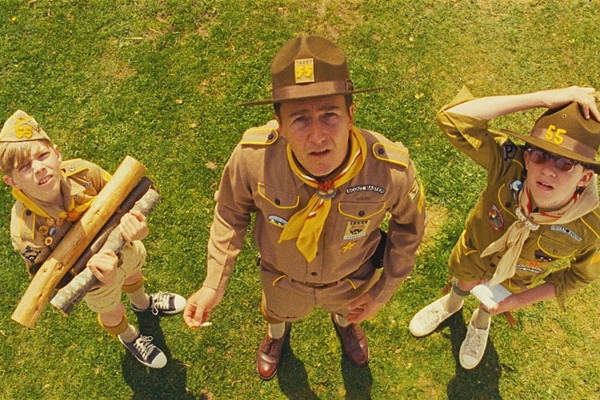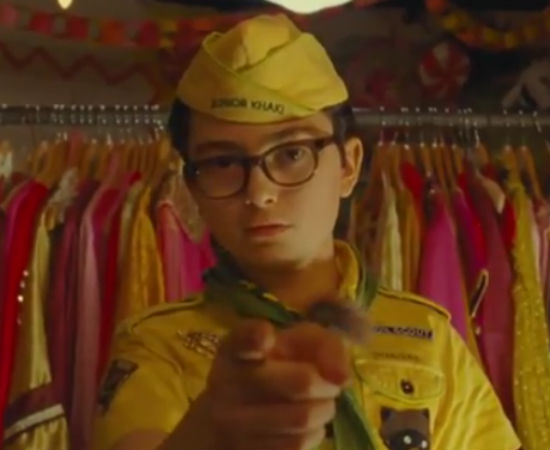|
Moonrise
Kingdom
Reviewed by
Damien Straker on
August 25th, 2012
Universal Pictures presents
a film directed by
Wes
Anderson
Screenplay
by
Wes Anderson and Roman Coppola
Starring:
Jared Gilman, Kara Hayward, Edward Norton, Bruce
Willis, Bill Murray, Frances McDormand, Tilda
Swinton and Jason
Schwartzman
Running
Time:
94 mins
Rating:
PG
Released:
August 30th,
2012
|
7/10
|
|
Moonrise
Kingdom is a comedy
set in the mid 1960's, where a boy named Sam (Jared Gilman) is
discovered to
have run away from his scout group. A note is left for Scout Master
Ward
(Edward Norton) who learns that Sam has fled with the equally young
Suzy (Kara
Hayward). We learn how they met and bonded through a flashback and that
Suzy
also has a fierce temper problem. Aiding Ward in the search for him are
his
fellow scout kids, who don't like Sam, as well as Captain Sharp (Bruce
Willis).
It is also revealed that Sam is actually an orphan and that his foster
parents
do not want him back in their home. Contrastingly, Suzy's parents Mr
and Mrs.
Bishop (Bill Murray and Frances McDormand) are angry at their
daughter's
disappearance and want her back. But it becomes apparent that their
relationship
is not on steady ground either.

Moonrise
Kingdom is everything
I've come to know from director Wes Anderson and yet his film remains
impossible to prepare for: it's regularly funny, original to a fault,
but overstuffed
and self-absorbed, like a never-ending sideshow of ideas and quirks.
One cannot
enter a Wes Anderson film expecting realism and gravitas. The success
of his
stylistic imprint is a cocktail of bizarre kookiness and offbeat
behaviour,
combined with minute observations about families that are in disarray
or highly
conflicted. His films succeed when they find the balance between these
binary
opposites, the absurd and the human condition. The
Darjeeling Limited (2007) is Anderson's best film because he
decided
to rein in the chaos, with a deeper resonance established between the
audience
and the characters. By contrast, Anderson's weakest effort, The
Life Aquatic with Steve Zissou (2004),
amplifies the director's entrancement with his own imagination and
auteurist
control, regardless of whether the audience can unscramble its
labyrinth of
plotlines, characters and gimmicks. Moonrise
Kingdom is the director's seventh
film and it is as problematic and
ambiguous as Anderson's work has ever been. I enjoyed the humour and
the
quirkiness far more than The Life Aquatic
but was still puzzled by its density and occasional inaccessibility. At
the
very least, the film will evoke discussion between audiences, even if
you think
that Anderson has lost his marbles.

The opening quarter of the film is terrifically
funny, offering some unique visual stylisation to enhance Anderson's
numerous
thematic concerns. A piece of music plays and we're told through a
voice-over
that various instruments are playing the same tune but at different
times. We
then see the inside of a house, with a child in each room. The camera
crabs
sideways between them, which reminded me a lot of a dollhouse and the
way that
each of the individual pieces are revealed and moved by a force
exterior from
that structure. But what Anderson reveals through his formal control,
is that
people do not have to be bound by rules or greater beings. We see a
deep
corridor in the house and expect it to be a long shot. But Suzy walks
directly
into the foreground so that we can see her up-close. What I could
deduce from
this was that Anderson is concerned with contrasting
perspectives of situations, particularly between adults and
children, but
also uncontrollable external forces
in life, such as love, the environment or the metaphysical. These
complex ideas
run parallel throughout the entire and it's amusing for the most part.
Dressed
in military gear, Sam sees his adventure as a chance for deep romance
but also
to display his survival skills in front of Suzy. Her parents just want
their
daughter back and expectedly disapprove of their relationship. There's
truth to
this conflict between the kids and adults. Children often overdramatise
and
role-play, omitting their sense of reality to create their own world.
Look for
a funny moment where Scout Master Ward asks the scout about their tree
house.
The camera retracts to a long shot, showing that they've built it
several
stories high into the air. The dialogue between some of the children,
though
some of Sam's conversations are unnecessarily cryptic, is also
deliberately
over mannered and serious to show how children speak dramatically,
like what they've heard in a movie as a substitute
for reality.

What is also interesting about the film and its
idea of contrasting perspectives is that it is not limited simply to
the children.
The adults seem to be as much in conflict with each other too. This
induces
some thought about the film's title. In very basic astrology, the moon
refers
to the instincts that are evoked in people. But the kingdom part could
also
refer to the hierarchy or social order of a land, in this case the
island off
New England. It seems necessary for the characters in this film to use
their
instincts in order to overcome the limitations of the social order. One
of the
more fascinating characters that I sympathised with was Scout Master
Ward. His
strict, orderly approach is shown through the panning of the camera as
he
inspects his troops. Yet even he has to answer to a higher scout
master, who
rips off his badge late in the film. It is only when Ward does
something
courageous that he can escape from conformity. It is also at this point
late in
the film that it starts to lose its magic when it tries to engage with
both
Biblical and metaphysical elements. Sam is struck by a lightning bolt
but
recovers instantly, a terrible storm also begins flooding the area and
there
are also people dressed in bird costumes. Is Anderson making allusions
to
Noah's Ark? Is he saying that like in the Bible story, people can craft
their
own worlds if they understand and acknowledge that there are
uncontrollable
forces like God? It provokes thought but I found that I was overwhelmed
trying
to decrypt not what was happening but why.

Nonetheless, Anderson has assembled a very
experienced and entertaining cast. The new additions as much as
Anderson's
regulars are well directed and pitched perfectly in delivering their
deadpan
lines. A lot of the dialogue is spoken straight faced and serious,
which makes
it hysterical. The only disappointment with the cast is that Tilda
Swinton and
Jason Schwartzman are criminally underused. Why is it essential for
Anderson to
cast them if he's barely going to use them? This is the complexion of
Wes
Anderson as a filmmaker. Few modern writer/directors are as unique or
as
imaginative in how they represent the disunity of family. He certainly
doesn't
need to simplify his work. Rather, to
build on the foundations of a potentially great filmmaker requires
clarity of
theme and image for the audience. No matter how much a King might think
of
himself, he must answer to his people.
|